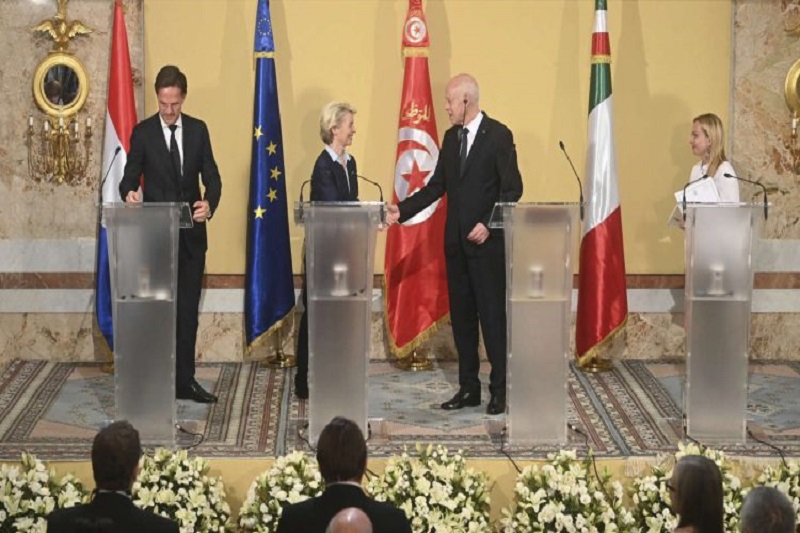The European Union and Tunisia inked a “strategic partnership” on Sunday in Tunis, with the primary focus on the battle against illegal immigration and the secondary goal of providing support to the North African nation in the face of significant economic challenges.
Ursula von der Leyen, the President of the European Commission, expressed her satisfaction with the deal, which will make it possible for Tunisia to “invest in shared prosperity.” She cited “five pillars,” one of which was the topic of migration, as being particularly significant. Tunisia, along with Libya, is one of the primary departure points for the thousands of migrants that make the journey across the Mediterranean Sea to Europe each year.
The Prime Ministers of Italy and the Netherlands, Giorgia Meloni and Mark Rutte, respectively, accompanied the European leader on this trip after their initial encounter a month ago, during which they proposed this alliance. The five pillars are “macroeconomic stability, trade and investment, green energy transition, people-to-people links, migration, and mobility,” according to a news release by the Commission.
The Tunisian President, Kais Saied, has received an invitation from Mrs. Meloni to attend a summit on migration that will take place in Rome the following Sunday. She is overjoyed about the Memorandum of Understanding. She added that the invitation was extended since the Memorandum of Understanding represents “another important step towards tackling the migration crisis in an integrated way.”
They came to an agreement, among other things, to bring the Erasmus student exchange program to Tunisia and to provide financial assistance of €65 million to 80 different educational institutions. On the topic of energy, the European leaders brought up the fact that Tunisia is now participating in projects to install an undersea fibre-optic cable as well as an electricity cable in order to connect the two sides of the Mediterranean.
In her remarks, Mrs. von der Leyen emphasised that the European Union was eager to help the development of renewable energies in the Maghreb country, which possesses “enormous potential. ” The relationship between Tunisia and the European Union (EU) “can be seen as a model for the establishment of new relations with North Africa,” according to Ms. Meloni.
Regarding immigration, Mr. Rutte was of the opinion that the deal would allow for “better control of irregular immigration.” In his address to the other heads of state, President Saied brought up the issue and urged them to come to “a collective agreement on inhumane immigration and (forced) displacement operations by criminal networks.”
“Tunisians have given these immigrants everything that could be offered with unlimited generosity,” pleaded Mr. Saied, who was heavily criticised for the manner in which hundreds of migrants were arrested in Tunisia and then “deported,” according to NGOs, to inhospitable areas on the borders with Algeria and Libya. Mr. Saied was strongly criticised for the manner in which hundreds of migrants were arrested in Tunisia.
Women and children were left abandoned in the midst of the desert without any water, food, or shelter, according to testimonies that were delivered over the phone to AFP and videos that were submitted to NGOs in Tunisia. According to statements made to AFP by those soldiers, Libyan border guards rescued at least 70 migrants on Sunday. The migrants were wandering in an area of the border between the two countries without any assistance, and the temperatures were intolerable.
Related Posts
Since Mr. Saied, who took over full authority in July 2021, criticised illegal immigration in February, a more overtly racist language has grown throughout Tunisia. He referred to “hordes of sub-Saharan migrants” who, he claimed, had arrived to “change the demographic composition” of the country. To put this into more tangible words, the deal between Brussels and Tunis provides for 105 million euros in funding to be used toward the fight against illegal immigration.
The EU has also pledged to make a direct financial contribution of 150 million euros in 2023. This occurs at a time when Tunisia, which is drowning in debt that accounts for 80% of its GDP, is running out of money, leading to persistent shortages of basic necessities that the state directly purchases. The European troika mentioned “macro-financial assistance of 900 million euros” on its first visit to Tunisia. This help would have been in the form of a loan and would have been provided to Tunisia over the course of the following few years.
On Sunday, Mrs. von der Leyen confirmed that Brussels is still “ready to provide this assistance as soon as the conditions are met.” However, this “assistance” is contingent on an agreement being reached between Tunisia and the International Monetary Fund (IMF) about a fresh credit in the amount of $2 billion, a matter that has been in limbo for a number of months.
The removal of subsidies on essential goods and the reorganisation of failing state businesses are two requirements that are absolutely necessary for an agreement with the IMF, but President Saied is opposed to both of them. It was on Sunday that he made the statement that it is necessary for us to “find new means of cooperation outside the international monetary framework.”

